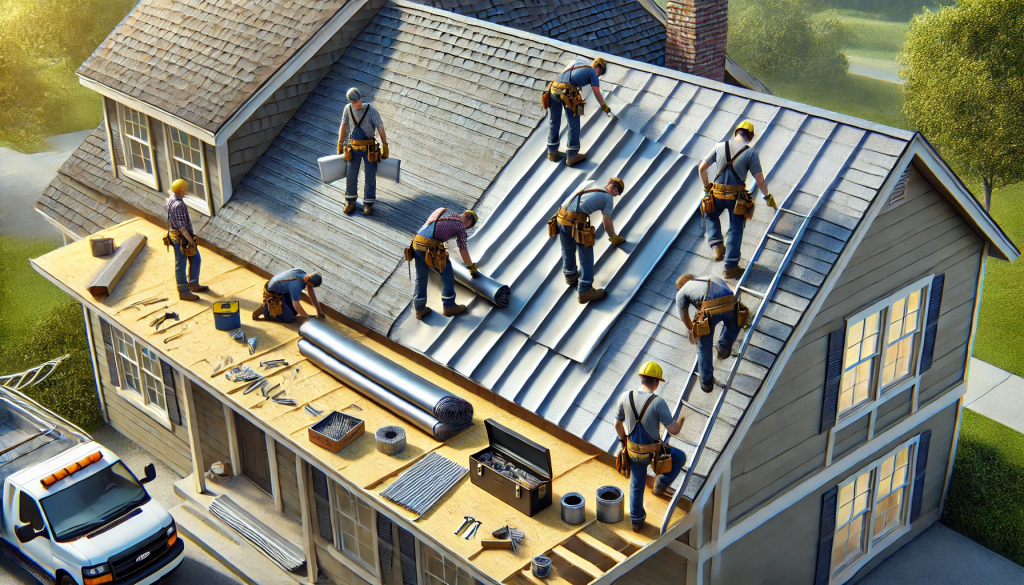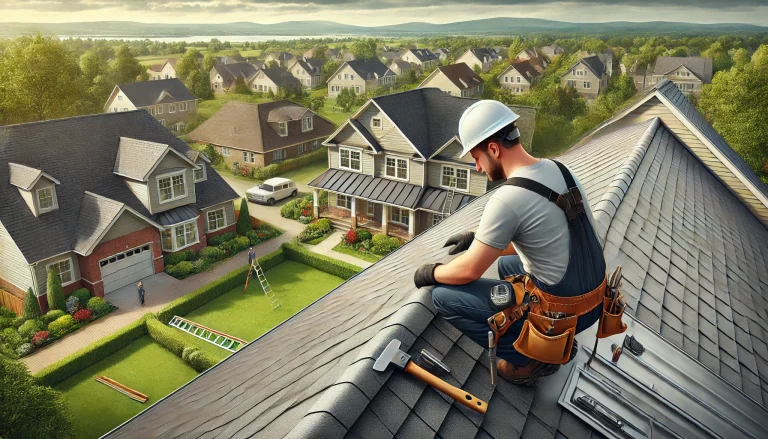In the Garden State, where weather patterns range from snowy winters to humid summers, homeowners are constantly seeking ways to improve their homes’ durability and energy efficiency. One question that frequently arises in New Jersey roofing discussions is, “Can you put a metal roof over shingles?” This comprehensive guide delves deep into the intricacies of installing a metal roof over existing shingles in New Jersey, providing you with the knowledge to make an informed decision for your home.
Understanding Metal Roofing and Shingle Overlay in New Jersey
Metal roofing has surged in popularity in New Jersey in recent years, and for good reason. Its durability in the face of harsh winter storms, energy efficiency during hot summers, and sleek appearance make it an attractive option for many New Jersey homeowners. The process of installing a metal roof over existing shingles, known as an “overlay” or “recover” roofing method, can offer several advantages in the Garden State’s varied climate.
Before diving into the specifics of metal roof installation over shingles in New Jersey, it’s essential to consider several key factors. The structural integrity of your home is paramount; your house must be able to support the additional weight of a metal roof on top of the existing shingles, especially considering potential snow loads in winter. New Jersey building codes play a significant role, as the state has specific requirements regarding the number of roof layers allowed. The condition of your current shingle roof is another critical factor – it should be in relatively good shape without major issues. Lastly, New Jersey’s climate, with its hot summers, cold winters, and occasional severe storms, can impact the suitability of a metal roof overlay.
The Benefits of Installing Metal Roofing Over Shingles in New Jersey
One of the primary advantages of choosing a metal roof overlay in New Jersey is cost-effectiveness. By avoiding the tear-off process, you can significantly reduce labor costs and disposal fees associated with removing the old shingles. This approach can make metal roofing, which is often perceived as a premium option, more accessible to a broader range of New Jersey homeowners.
Time efficiency is another notable benefit, especially important in New Jersey’s unpredictable weather. Metal roof installation over existing shingles typically takes less time than a complete roof replacement. This quicker process minimizes disruption to your daily life and reduces exposure to potential weather-related complications during installation, which can be crucial during New Jersey’s storm seasons.
Energy efficiency is a hallmark of metal roofing, and this benefit is particularly valuable in New Jersey’s climate. The additional layer created by the overlay can enhance insulation, potentially leading to lower heating costs during harsh winters and reduced cooling expenses in hot summers. Many metal roofing products are designed with reflective properties, further contributing to energy savings by reducing heat absorption during New Jersey’s humid summer months.
Longevity is perhaps one of the most compelling reasons for New Jersey homeowners to consider a metal roof. Quality metal roofing can last anywhere from 40 to 70 years or more, significantly outlasting traditional asphalt shingles in the face of New Jersey’s varied weather conditions. By installing metal over existing shingles, you’re essentially adding a durable protective layer that can extend the overall lifespan of your roofing system, providing peace of mind and long-term value.
Environmental considerations also favor metal roof overlays, aligning with New Jersey’s growing focus on sustainability. This method reduces the amount of waste sent to landfills by eliminating the need to tear off and dispose of the old shingles. Additionally, metal roofing materials are often made from recycled content and are fully recyclable at the end of their life cycle, making them a more sustainable choice for environmentally conscious New Jersey homeowners.
Potential Drawbacks and Challenges in New Jersey
While the benefits of installing a metal roof over shingles in New Jersey are numerous, it’s important to consider potential drawbacks. The added weight of a metal roof on top of existing shingles is a primary concern, especially given New Jersey’s potential for heavy snowfall. This increased load can stress your home’s structure, potentially leading to issues if your home isn’t capable of supporting the extra weight. A professional inspection by a New Jersey-licensed contractor is crucial to ensure your home can handle this additional burden safely.
The existing shingles may create an uneven surface for the metal roof installation, a concern that can be exacerbated by any previous storm damage common in New Jersey. This unevenness can potentially lead to issues with proper fitting and sealing if not addressed correctly. Skilled New Jersey installers can mitigate this problem by using underlayment and proper installation techniques, but it remains a consideration that must be addressed during the planning phase.
Moisture trapping is another potential issue that requires careful consideration, particularly given New Jersey’s humid climate. If not properly ventilated, moisture can become trapped between the metal roof and the old shingles, potentially leading to mold, mildew, or rot. Proper installation techniques, including the use of breathable underlayment and, in some cases, the addition of furring strips to create an air gap, can help prevent these moisture-related problems that are of particular concern in New Jersey’s climate.
Warranty considerations should also factor into your decision-making process. Some metal roofing manufacturers may void or limit their warranty if the product is installed over existing shingles. It’s essential to carefully review warranty terms and discuss this aspect with your New Jersey roofing contractor before proceeding with an overlay installation.
The Installation Process: Metal Roofing Over Shingles in New Jersey
Understanding the installation process can provide valuable insights into the complexity of the project and help you appreciate the importance of professional installation by a licensed New Jersey contractor. The process begins with a thorough inspection of the existing roof, paying particular attention to any damage from previous New Jersey storms. Any damaged shingles, soft spots, or other issues should be addressed before installation begins. The roof surface must be clean and as smooth as possible to ensure a successful overlay.
Following the inspection and preparation, a synthetic underlayment is typically installed over the existing shingles. This underlayment serves two crucial purposes: it provides an additional moisture barrier (important in New Jersey’s varied climate) and creates a smoother surface for the metal panels. The choice of underlayment is critical, as it needs to be breathable to prevent moisture accumulation while still offering robust water resistance.
In New Jersey, where humidity levels can be high, furring strips may be installed to create an air gap between the old shingles and the new metal roof. These strips improve ventilation and help prevent moisture buildup, which is particularly important given the state’s climate. The decision to use furring strips should be based on your specific location within New Jersey and the recommendations of roofing professionals familiar with local conditions.
The actual installation of the metal panels is a precise process that requires skill and experience, especially considering New Jersey’s building codes and weather considerations. Panels are typically installed starting from the eaves and working upward. Proper fastening techniques are crucial to ensure a secure and water-tight installation, particularly important in New Jersey where high winds from coastal storms can be a concern. The type of fasteners used and the pattern of installation can vary depending on the specific metal roofing system and local building codes, particularly in areas prone to high winds like along the Jersey Shore.
The installation is completed with the addition of trim pieces, ridge caps, and any necessary flashing. These finishing touches are not just aesthetic considerations; they play a crucial role in ensuring the roof is watertight and can withstand New Jersey’s varied elements for decades to come. Proper installation of these components is essential for the long-term performance of your metal roof in New Jersey’s challenging climate.
Choosing the Right Metal Roofing Material for New Jersey
The choice of metal roofing material can significantly impact the performance, appearance, and cost of your new roof, especially considering New Jersey’s climate. Steel is a popular choice due to its durability and cost-effectiveness. It’s typically galvanized or coated with a zinc-aluminum alloy to prevent rust (important in New Jersey’s humid environment), and then covered with a baked-on paint finish for added protection and color options.
Aluminum is another excellent option, particularly for New Jersey’s coastal areas due to its natural resistance to salt corrosion. It’s lightweight, which can be advantageous in overlay installations where weight is a concern. Aluminum roofing is also highly reflective, contributing to its energy efficiency – a valuable feature during New Jersey’s hot summers.
For those seeking a premium look, copper roofing offers unparalleled beauty and longevity. While more expensive initially, copper develops a distinctive patina over time and can last for centuries with proper care, standing up well to New Jersey’s varied weather conditions. Its antimicrobial properties also make it resistant to algae and fungus growth, which can be beneficial in New Jersey’s humid climate.
Zinc is gaining popularity as a roofing material in New Jersey due to its extremely long lifespan and low maintenance requirements. Like copper, zinc develops a protective patina over time, and its malleability makes it suitable for complex roof designs often found in New Jersey’s diverse architectural landscape.
Legal and Code Considerations in New Jersey
Before proceeding with a metal roof overlay in New Jersey, it’s crucial to navigate the state’s legal and code requirements. New Jersey’s Uniform Construction Code limits the number of roof layers allowed on a structure to two. This means if you already have two layers of shingles, you will be required to tear off the existing roofing before installing a metal roof.
Permit requirements in New Jersey are strict, and most areas require permits for roofing projects, especially when changing the roofing material. The permitting process often involves submitting plans and specifications for approval before work can begin. It’s essential to work with a contractor who is familiar with New Jersey’s specific requirements and can navigate the permitting process efficiently.
Fire ratings are another important consideration in New Jersey. Your proposed roofing system must meet the state’s fire resistance requirements. Some jurisdictions may require specific underlayment or decking materials to achieve the necessary fire rating when installing metal over shingles.
In areas prone to high winds, such as along the Jersey Shore, specific installation methods may be required to meet wind resistance standards. This might include more frequent fasteners, special edge treatments, or additional reinforcement in vulnerable areas of the roof. These considerations are particularly important given New Jersey’s exposure to coastal storms and occasional hurricanes.
Maintenance and Care for Your New Metal Roof in New Jersey
While metal roofs are known for their low maintenance requirements, proper care can help maximize their lifespan and performance in New Jersey’s challenging climate. Regular visual inspections, ideally conducted at least twice a year (spring and fall) and after severe weather events, can help identify potential issues before they become serious problems. Look for any signs of damage, loose fasteners, or areas where sealant may have degraded, paying particular attention after New Jersey’s harsh winters or summer storms.
Keeping your metal roof clean is important for both appearance and function in New Jersey. Remove debris, leaves, and branches to prevent moisture accumulation and potential damage. In most cases, a gentle rinse with a garden hose is sufficient for cleaning. Avoid using pressure washers or harsh chemicals, which can damage the roof’s protective finish.
Pay special attention to the roof’s fasteners during your inspections, as New Jersey’s freeze-thaw cycles can affect their integrity over time. Ensure that they remain tight and replace any that show signs of wear or corrosion. Loose fasteners can lead to leaks and may allow wind to get under the metal panels, potentially causing more extensive damage during New Jersey’s stormy seasons.
If you notice any damage or potential problems during your inspections, it’s crucial to address them promptly, especially given New Jersey’s potential for severe weather. Small issues can quickly escalate if left unattended, potentially leading to leaks or more extensive damage. When in doubt, consult with a professional New Jersey roofing contractor who specializes in metal roofing and understands the unique challenges posed by the state’s climate.
Conclusion: Weighing the Pros and Cons for New Jersey Homeowners
Installing a metal roof over existing shingles can be an excellent option for many New Jersey homeowners, offering benefits such as cost savings, improved energy efficiency, and extended roof lifespan in the face of the state’s challenging climate. However, it’s crucial to carefully consider the potential drawbacks and ensure that this method is suitable for your specific situation and location within New Jersey.
The decision to install a metal roof over shingles should be based on a thorough evaluation of your home’s structure, local building codes, New Jersey’s climate considerations, and long-term plans for the property. While the initial cost may be higher than a traditional shingle replacement, the longevity and benefits of a metal roof can provide excellent value over time, especially considering New Jersey’s varied weather patterns.
By thoroughly researching your options, consulting with New Jersey roofing professionals, and considering the long-term implications, you can make an informed decision about whether a metal roof overlay is the right choice for your home. Remember, a well-installed metal roof can provide decades of protection and enhance your home’s value, making it a worthwhile investment for many New Jersey property owners. Whether you choose a metal overlay or opt for a different roofing solution, the key is to make a decision that balances your immediate needs with long-term value and performance in New Jersey’s unique environment.



